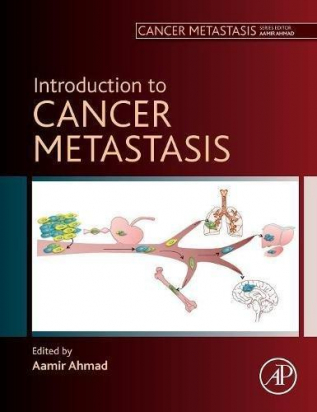Non ci sono recensioni
DA SCONTARE
Introduction to Cancer Metastasis provides, in one place, an overview of organ-specific cancer metastasis and the most common sites of cancer metastasis. Through specific chapters on individual primary cancers, their metastasis, and chapters on common metastatic sites, this volume comprehensively informs readers about the broader knowledge base in cancer metastasis. The process of metastasis is particularly responsible for making cancer so lethal. This volume explores both metastasis from sites of origin and common metastatic sites, thus increasing understanding of both perspectives.
Description
Key Features
Table of Contents
- Series Page
- List of Contributors
- Preface
-
Part I. Cancer Metastasis From Primary Organs
-
Chapter 1. Cancer Metastasis: An Introduction
- 1. Introduction
- 2. Disruption of Cell Adhesion: Initiation of Metastasis
- 3. Matrix Metalloproteinases in Cancer Metastasis
- 4. EMT in Cancer Metastasis
- 5. Organ-Specific Metastasis
- 6. microRNAs and Cancer Stem Cells in Cancer Metastasis
- 7. Conclusions and Perspectives
-
Chapter 2. Breast Cancer Metastasis
- 1. Introduction
- 2. Biology
- 3. Metastatic Dissemination
- 4. Prognostic Factors After Recurrence
- 5. Treatment for Metastatic Breast Cancer
- 6. Conclusions
-
Chapter 3. Prostate Cancer Metastasis
- 1. Epidemiology and Overview of Metastatic Prostate Cancer
- 2. Cellular Biology of Prostate Cancer Metastases
- 3. The Metastatic Cascade
- 4. Conclusions
-
Chapter 4. Lung Cancer Metastasis
- 1. General Information
- 2. Mechanism of Metastasis
- 3. Molecular Mechanism in the Regulation of Lung Cancer Metastasis
- 4. Epithelial to Mesenchymal Transition in Lung Cancer
- 5. Cancer Stem Cells
- 6. Concluding Remarks
-
Chapter 5. Cervical Cancer Metastasis
- 1. Introduction
- 2. Risk Factors
- 3. Pathogenesis
- 4. Histopathology
- 5. Routes of Dissemination
- 6. Major Molecular Factors
- 7. Conclusion
-
Chapter 6. Colorectal Cancer Metastasis
- 1. Introduction
- 2. Molecular Aspects of Colorectal Cancer Metastasis
- 3. Main Sites of Colorectal Cancer Metastasis
- 4. Therapeutic Options for Metastatic Colorectal Cancer
- 5. Challenges and Probable Solutions
- 6. Conclusions
-
Chapter 7. Metastatic Pancreatic Cancer: Current State and Future Directions
- 1. Introduction
- 2. Management of Pancreatic Ductal Adenocarcinoma
- 3. Molecular Mechanisms Driving Metastasis
- 4. In Vivo Experimental Models
- 5. Open Question: Onset and Dynamics of Metastases
- 6. Conclusions
-
Chapter 8. Gastric Cancer Metastasis
- 1. Epidemiology and Screening Programs
- 2. Metastatic GC—Clinical Aspects
- 3. Diagnosis of Metastatic GC With a Particular Focus on 18-F-FDG PET/CT
- 4. Prognostic and Predictive Factors
- 5. Biomarkers
- 6. Treatment Methods of Metastatic GC
- 7. Conclusion
-
Chapter 9. Hepatocellular Carcinoma: Metastatic Disease
- 1. Introduction
- 2. Epidemiology
- 3. Diagnosis
- 4. Prognosis and Staging
- 5. Treatment
- 6. Conclusions
-
Chapter 10. Metastatic Bladder Cancer
- 1. Introduction
- 2. Epidemiology
- 3. Staging
- 4. Grading
- 5. Staging Tools
- 6. Emerging Biomarkers
- 7. Prognostic Factors
- 8. Clinical Presentation of Metastatic Bladder Disease
- 9. Management of Clinically Localized Bladder Cancer, Positive Pelvic Nodes and Metastatic Disease
- 10. Clinical Prognosticators
- 11. Management of Metastatic Bladder Cancer
- 12. New Agents
- 13. Immunotherapy
- 14. Role of Surgery in Metastatic Bladder Cancer
- 15. Conclusions
-
Chapter 11. Metastatic Cutaneous Squamous Cell Carcinomas
- 1. Introduction
- 2. Defining the High-Risk Variant
- 3. Staging Systems
- 4. Treating High-Risk Cutaneous Squamous Cell Carcinoma
- 5. Sentinel Node Biopsy
- 6. Treatment of Locally Advanced or Metastatic Cutaneous Squamous Cell Carcinoma
- 7. Concluding Remarks
-
Chapter 12. Osteosarcoma Metastasis—Prognostic Factors and Treatment Strategies
- 1. Introduction
- 2. Clinical Features of Metastasis From Osteosarcoma
- 3. Treatment for Metastasis From Osteosarcoma
- 4. Conclusion
-
Chapter 1. Cancer Metastasis: An Introduction
-
Part II. Cancer Metastasis To Distant Organs
-
Chapter 13. Lymph Node Metastasis
- 1. Introduction
- 2. History
- 3. Mechanisms—How Tumors Metastasize to Lymph Nodes
- 4. Clinical Aspects of Lymph Node Metastasis
- 5. Pathology
- 6. Conclusions & Summary
-
Chapter 14. Molecular Involvement of the Bone Marrow Microenvironment in Bone Metastasis
- 1. Introduction
- 2. Types of Bone Metastasis
- 3. Pathophysiology of Bone Metastasis
- 4. Treatment Options for Bone Metastasis
- 5. Discussion/Conclusion
-
Chapter 15. An Overview on Hepatic Metastasis
- 1. Introduction
- 2. Hepatic Physiology and Cancer Biology
- 3. Hepatic Functional and Surgical Anatomy
- 4. Clinical Presentation and Diagnosis
- 5. Treatment of Hepatic Metastases
- 6. Conclusions
-
Chapter 16. Pulmonary Metastasis
- 1. Development of Pulmonary Metastases
- 2. Rationale for Local Treatment of Pulmonary Metastases
- 3. Diagnosis of Pulmonary Metastases
- 4. Preoperative Exams
- 5. Surgical Resection
- 6. Radiological Ablation
- 7. Radiotherapy
- 8. Lymph Node Involvement
- 9. Resection of Recurrent Metastases
- 10. Lung Metastasis in Given Tumor Types
- 11. Conclusion
-
Chapter 17. Brain Metastasis: Basic Biology, Clinical Management, and Insight From Experimental Model Systems
- 1. Introduction
- 2. Biology
- 3. Clinical Management
- 4. Experimental Model Systems
- 5. Preclinical Findings
- 6. Conclusion
-
Chapter 13. Lymph Node Metastasis
-
Part III. Emerging Targets for Cancer Metastasis
-
Chapter 18. Developmental Pathways: Emerging Therapeutic Targets for Cancer Metastasis
- 1. Introduction
- 2. Prometastatic Changes and Developmental Pathways
- 3. Notch Signaling and Metastasis
- 4. Antimetastatic Potential of Wnt and Hedgehog Targeting
- 5. Concluding Remarks
-
Chapter 19. Emerging Therapeutic Targets for Cancer Metastasis: From the Perspective of Embryo Implantation
- 1. Introduction
- 2. The Similarity Between Embryo Implantation and Tumor Metastasis
- 3. Trophoblast Invasion Inhibitory Factors Derived From the Maternal Endometrium During Embryo Implantation and Their Implications in Cancer Metastasis
- 4. Conclusions and Perspectives
-
Chapter 20. Wnt Signaling as a Therapeutic Target in Cancer and Metastasis
- 1. Introduction
- 2. Wnt Signaling and Cancer
- 3. The Role of Wnt Signaling in Epithelial–Mesenchymal Transition and Cancer Stem Cells
- 4. Therapeutic Strategies Targeting Wnt Signaling
- 5. Protein Knockdown Strategies
- 6. Viral-Based Therapies
- 7. Conclusion
-
Chapter 18. Developmental Pathways: Emerging Therapeutic Targets for Cancer Metastasis
- Index




